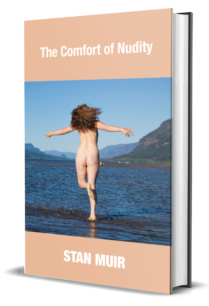Nudity is a universal fascination. From art to media, the human form has captivated our imagination for centuries. Yet, discussing the act of watching naked people often sparks controversy. As naturists, we embrace nudity not merely as a state of being but as a profound expression of authenticity and connection. Contrary to societal taboos, enjoying the sight of naked bodies is neither inherently sexual nor objectifying—it’s a celebration of humanity in its rawest, most honest form.
This post explores the naturist perspective on nudity, shedding light on why seeing and being seen can be an uplifting and emotional experience.
Naturism and the Human Form
Naturism teaches us that the naked human body is natural, diverse, and beautiful. By normalizing nudity, naturists strip away the layers of shame and judgment that society often attaches to our bodies. My own experience as a naturist has transformed the way I view nudity. I no longer associate it with embarrassment or taboo. Instead, I see it as an opportunity to embrace authenticity and appreciate the beauty of others without judgment.
In naturist settings, watching others is a shared experience of mutual respect. It’s about appreciating the variety of human forms without objectification or pretense. The act of seeing and being seen reinforces a sense of belonging and acceptance, highlighting the diversity that makes us human.
Nudity in Art and Culture
Throughout history, the naked body has inspired countless works of art. Classical nude paintings, for example, capture the essence of humanity without overt sexualization. Publications like Model Society further celebrate nudity as an art form, presenting the human body in ways that evoke emotion and connection rather than lust.
In media, nudity often sells because it taps into our natural curiosity and appreciation for the human form. While commercial representations can sometimes veer into objectification, they also underscore the universal allure of nudity. This fascination isn’t inherently sexual; it’s a reflection of how the naked body resonates with us on a deeper, emotional level.
Seeing and Being Seen
One of the most beautiful aspects of naturism is the joy of seeing others and being seen in return. For me, this joy is most evident in naturist resorts, where nudity is normalized and celebrated. I love observing the diversity of bodies—young and old, slender and curvy, scarred and smooth. Each form tells a story, and collectively, they create a tapestry of humanity.
Contrary to misconceptions, this enjoyment is not voyeuristic. Voyeurism involves deriving sexual satisfaction from watching others without their consent. Naturism, on the other hand, is grounded in mutual respect and consent. While it’s natural for nudity to sometimes evoke sexual feelings, these emotions are not the driving force behind the naturist ethos. There’s nothing wrong with sexuality, but naturism emphasizes respect for oneself and others, creating a space where people can feel safe and accepted.
Challenging Misconceptions
Critics often accuse naturists of voyeurism or claim that enjoying nudity inherently objectifies people. To this, I say: Nudity does not objectify people; it reveals them as they are. Objectification comes from viewing someone solely as a means to an end, stripping away their humanity. In naturism, nudity is a way of celebrating humanity, not diminishing it.
Personally, I enjoy seeing naked people—not in a voyeuristic or staring manner, but in a way that appreciates their confidence and comfort in their own skin. This perspective reinforces the naturist values of respect and authenticity, showing that nudity can be a source of joy and connection without objectification.
Naturists can challenge these misconceptions by openly discussing the values of respect, authenticity, and connection that underpin our lifestyle. By sharing personal experiences and engaging in honest dialogue, we can demystify nudity and encourage others to see it as a normal, beautiful aspect of life.
Communicating the Joy of Naturism
To make the joy of seeing and being seen relatable to non-naturists, we must emphasize that nudity is normal and that naturism is about fostering respect. It’s our behavior, not our lack of clothing, that determines how others perceive us. By embodying the principles of naturism—authenticity, respect, and community—we can inspire others to embrace nudity as a source of freedom and self-acceptance.
Nudity is far more than skin deep. For naturists, it’s a way of connecting with ourselves, each other, and the world around us. By celebrating the diversity of the human form and challenging societal taboos, we open the door to a deeper understanding of what it means to be human.
Let us continue to advocate for a world where nudity is normalized and appreciated, not feared or stigmatized. In doing so, we can foster a culture of acceptance and respect, one naked moment at a time.
Get Nude, Stay Nude, Live Nude and Share the Nude Love!
All pictures are from the website NudismLife
Nude and Happy – A Passion for Nudism and Naturism is a reader-supported publication. To receive new posts and support my work, consider becoming a free or paid subscriber.









Loved this post! A word mentioned throughout is “celebrate” – it is key! I love seeing people who have the confidence to openly celebrate our basic humanness and challenge oppressive stigmas and unfounded notions of what a human body is and should be!